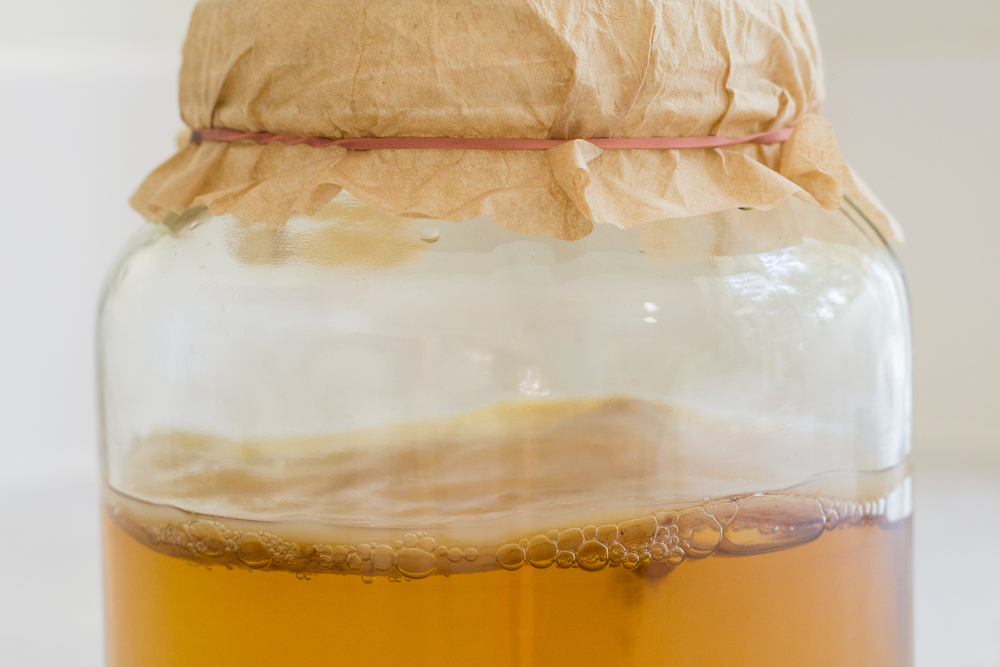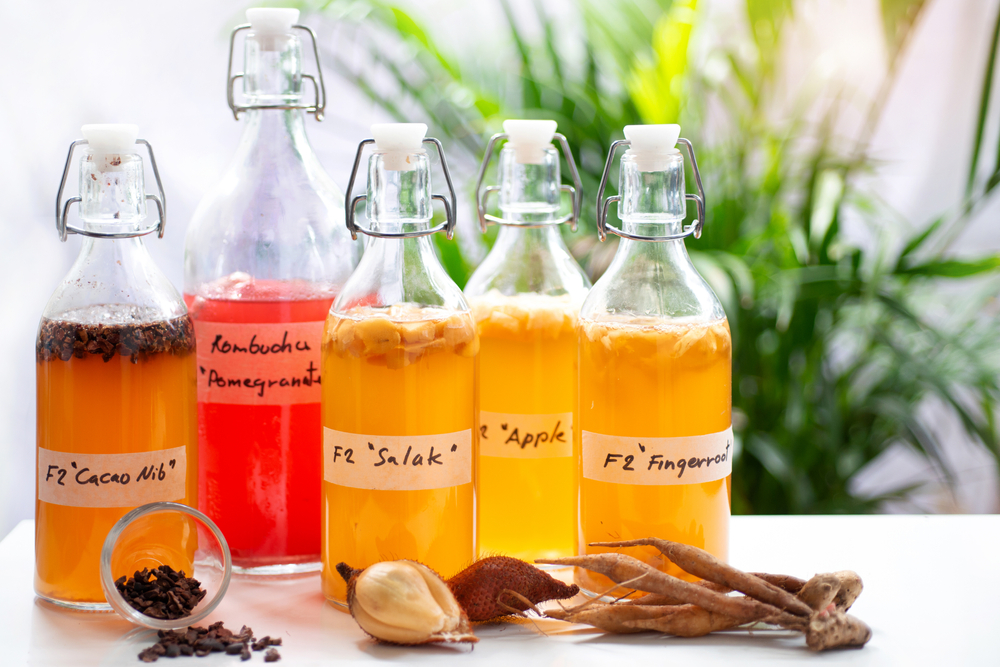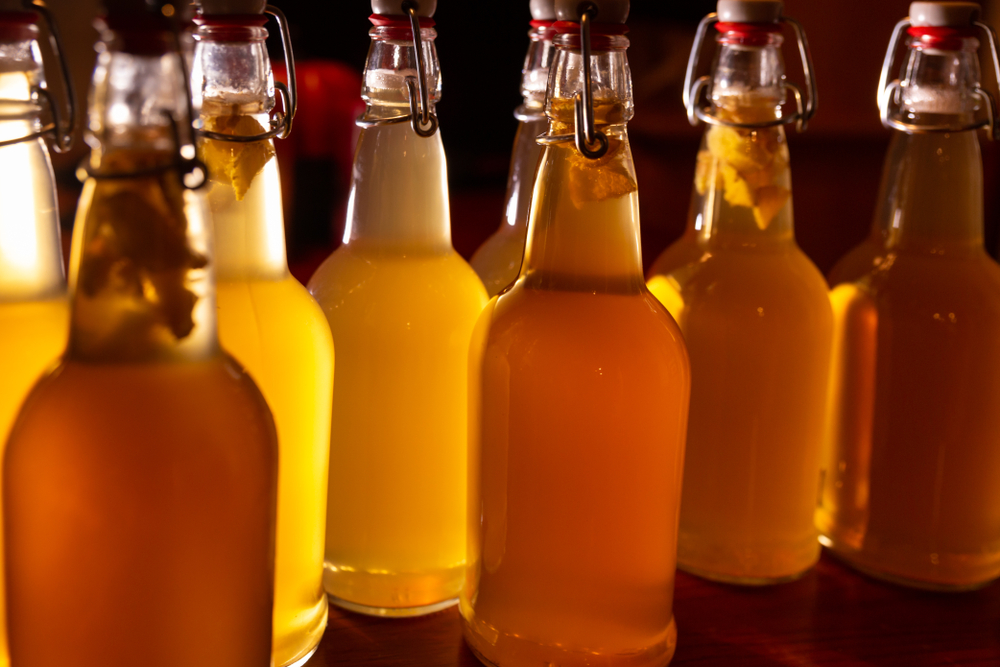Homemade kombucha has a long shelf life when stored properly. Incorrect storage can accelerate carbonation, increase the alcohol content, and make the tea tart. If you maintain your kombucha correctly, you can create a self-sufficient cycle of kombucha.
Table of Contents
What Is the Best Way to Store Homemade Kombucha?
Proper treatment, storage, and temperature control are necessary during the entire process of home brewing kombucha.
Storing Kombucha Tea During Fermentation
Kombucha fermentation happens in two stages. In the first stage, you mix 10% starter tea and 90% sweet tea at room temperature, or slightly warmer, away from direct sunlight in a brewing vessel and let it sit for a week. Living cultures and probiotics are formed, eventually becoming mildly carbonated raw kombucha.

The second stage is when additional ingredients like fruits are added. Transfer the kombucha to glass bottles or a sealed container and leave it for approximately four days at room temperature, away from direct sunlight.
This imparts flavor and enhances the carbonation of the drink. Once you notice bubbling after a few days, you can put the drink in the fridge (which stops the fermentation process) and enjoy it whenever you feel like it.
Ready to Drink Kombucha
Fully-fermented homemade kombucha should be stored in the refrigerator. You can store it in any bottle or container as long as it’s airtight and clean; however, glass bottles are preferable.
If the bottle is not tightly sealed, the fermented tea can interact with air and accelerate carbonation, increasing alcohol production and creating a tart taste.
Always leave one to two inches of space at the top of the container to allow the buildup of carbon dioxide to settle somewhere. Without ample space, the carbon dioxide buildup may push against the container, potentially harming brewers and their families if they’re not careful.
What Are the Effects of Storing Kombucha in the Refrigerator?
Keeping unpasteurized kombucha in a refrigerated environment significantly slows the fermentation process.
Alcohol and acidity levels will stay at relatively similar levels for months. The living enzymes and bacteria in the kombucha will also face a slowdown in activity due to the reduced motion and kinetic energy from the cooler temperature.
Furthermore, storing kombucha in the refrigerator prevents the drink from over-fermenting and acquiring an undesirable vinegary flavor. Conversely, if you keep kombucha out in the open for days, it can also pasteurize, effectively killing the good bacteria that kombucha is well-known for.
Does Kombucha Need to Be Stored at a Specific Temperature?
Ideally, yes. The ideal temperature range for fully-fermented kombucha is about 35 to 45 degrees Fahrenheit (4-7 Celcius). Kombucha, and most fermented foods for that matter, hosts many living microorganisms that must be kept in certain temperature ranges to remain active.
First-fermentation kombucha brews should be stored at a temperature range of about 75 to 85 degrees Fahrenheit. The higher the temperature, the stronger the kombucha liquid will become.
Second-fermentation kombucha brews can also stay at the abovementioned temperature, but 68 degrees Fahrenheit is the absolute minimum. Once past this stage, kombucha must be stored in a cooler environment to slow down the fermentation process.

Keeping the temperature under control is vital for a successful and fizzy batch of kombucha. Going above or below the threshold can result in a pasteurized and unpalatable beverage.
How Long Can You Store Homemade Kombucha?
Once your kombucha batch has passed the two initial fermentation stages, it can last up to three months when stored correctly in the refrigerator. If the kombucha is stored in an airtight container and sealed in a dark, cool place away from direct sunlight (like a wine cellar), it can stay fresh even longer.
That said, exposing your kombucha to the air after storing it can hasten the expiration date of the entire batch, so keep your brew sealed and secure to ensure a high-quality drink.
Will You Get Sick if You Drink Unrefrigerated Kombucha?
You won’t get sick after drinking kombucha left at room temperature—even if it’s been out for a day.
That said, even though it won’t make you ill, unrefrigerated kombucha can taste foul and vinegary. It can also taste more alcoholic, acidic, and carbonated.
If you left it out for a while, we recommend finishing the entire batch within a week to retain your bottled kombucha’s health benefits and fizz. Alternatively, you can use this liquid as a starter tea with a SCOBY for future batches of delicious kombucha.

